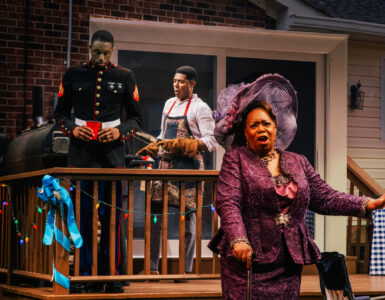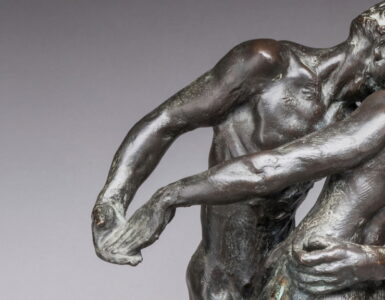If you go see Hyde Park on Hudson anticipating historical perspective or an in-depth portrait of one our country’s greatest presidents, you’ll be disappointed. On the other hand, if you like seeing accomplished actors deal in the nuances of human behavior and don’t care all that much about historical accuracy, you may enjoy this film.
Directed by Roger Michell, Richard Nelson’s screenplay draws on the papers of Margaret Suckley, a distant cousin of FDR and one of his confidantes and companions during World War II and up to his death. After she died in 1991, a box of papers was found under her bed that contained correspondence to and from the former president. The letters covered a variety of general topics – and they implied that Franklin and Daisy, as he like to call her, may have been physically intimate. The film takes this supposition and runs with it – much in the spirit a romantic historical novel that fills in the gaps between known events.
The major historical event in this case is the visit of the King and Queen of England to the United States in June 1939. The visit was intended to forge a bond between the two countries and garner support for America’s entry into the war, an act the British desperately hoped for. Historians believe that even at this early date, two and a half years before Pearl Harbor, Roosevelt personally supported intervention (defying the isolationism that pervaded the electorate), and that he invited the royal pair to his home in Hyde Park to encourage photo-ops that would make the American public feel warmly toward his visitors.
The story is launched from the point of view of Daisy, portrayed with the spot-on intensity and intrepid grace that is the infallible mark of any Laura Linney performance. Awkward and unworldly by Washington standards, Linney’s Daisy is living in the country with her invalid aunt when she’s summoned to the White House by Franklin’s mother Sarah (Elizabeth Wilson) to provide company for the president (Bill Murray). Called to his study, she lingers uncertainly by the door until he breaks the ice by offering to show her his stamp collection. Some indefinite time later they take a drive and stop among a field of flowers. There’s an awkward silence until Daisy, apparently not so naïve after all, realizes that the president, like so many other men in a vehicle with a woman, is angling for a blow job (or maybe a hand job).
Even as the focus of Daisy’s life becomes her affair with the president, the focus of the film shifts to the visit of King George VI (Samuel West) and Queen Elizabeth (Olivia Colman). Their British propriety stands in sharp contrast to the looser conventions operating at Hyde Park, where Eleanor (Olivia Williams) resides with “other women” in separate quarters from Franklin, and the dalliance between Franklin and Daisy does not go unnoticed.
Much humor (an excess, in my opinion) is wrung from the royals’ trepidation over the upcoming picnic: their nervous expectation that hot dogs will be served and that they will be forced to eat them. A more serious and legitimate plot thread develops around the mentor-student – almost father-son – relationship forged, on Roosevelt’s initiative, between himself and the king, an unassuming man afflicted with a stutter and uneasy in his role as monarch. (The same personage was central to the 2010 Oscar-winner, The King’s Speech, starring Colin Firth). West gives an unerring performance as the unpretentious king, struggling to resolve his personal anxieties with the part on the world stage he’s been called on to play. A scene between him and Roosevelt, in which the latter gamely exposes the extent of his disability in his campaign to build the younger man’s confidence, is the dramatic highlight of the film.
Which brings me to Murray’s performance: It’s a deft rendering of a multifaceted personality in power, and for that the actor surely deserves credit. As FDR, however, it misses the mark. Part of the problem is Murray’s aura, or essence, or whatever you might want to call it – that idiosyncratic quality that’s made him effective as the nonconformist or impious malcontent in so many roles he’s played in the past. A whiff of that cheekiness seeps through in this narrative as well – a quality not incompatible with power but hard to reconcile with the man who oversaw the New Deal and who commandeered our nation during a terrible war. Aside from that, one of the movie’s main shortcomings is that we hardly ever see FDR at work. Yes, the story is set in his private home and not at the White House – but Murray’s commander-in-chief seems so utterly and consistently wrapped up in personal relationships to the exclusion of policy matters that the president thing is hard to buy.
On the plus side is an array of fine supporting performances that includes Elizabeth Wilson as Franklin’s officious mother, turned obsequious in the presence of the royals, and the lovely Olivia Williams, here transformed into a gawky plain Jane, as Eleanor. Elizabeth Marvel is also terrific as Missy LeHand, the president’s private secretary, who finally shows the weepy Daisy what’s what. Hyde Park is also a lush film and a wonderful period piece – rather like an American Downton Abbey that’s fun to dally in if, like me, you like that sort of thing.
Review by Deborah Klugman.
Opening Dec. 7 at the Landmark Cinemas, 10850 W. Pico Blvd. in West Los Angeles; (310) 470-0492







